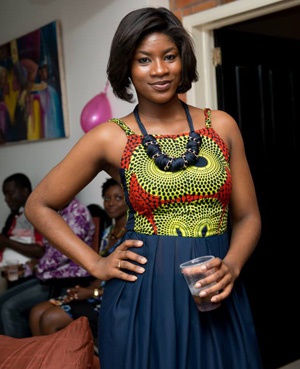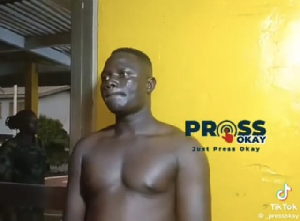Vanessa Teye is a Ghanaian fashion designer and Chief Executive of B’VENAJ Designs. Vanessa’s classy designs helped her to participate in several major fashion events, including the Baltimore Fashion Week in Maryland USA and Raw DC Artiste Fashion Week in Washington DC.
She is currently preparing to unleash her latest collection called Papillom this June.
In this interview with NEWS-ONE’s Francis Addo, she speaks about her passion for the fashion designing and why she thinks there is no fashion industry in Ghana.
Why did you go into fashion designing?
It is something I knew I wanted to do at age thirteen, so I decided to pursue it. My mum was in the business and my grand mum too, so I guess I am just going through the tradition. I watch my mum sow all the time, you know, like make clothes for people and all that. So I just had the passion for it at that age and I decided to take it serious. While in high school I studied Visual Arts and did more of sketching. In 2010, I went to Joyce Ababio College of Creative Design to actually perfect myself in the fashion industry. I did that and after I graduated, I worked with her for a year. Then I started my own thing – B’VENAJ Designs.
When did you become a professional fashion designer?
2010 because at the point in time, I was already making clothes; I was already sketching, putting things together, designs and all. After that I have been part of some runway fashion events. I have done Catwalk For Orphans, which I think was organised by XFM. I have done the Plus Size Fashion Show by Exopa. Kwaisey Pee and friends did a show at the Golden Tulip Hotel and I showcased my designs there. I have also done Glitz Africa Fashion Week and did two other shows abroad; Baltimore Fashion Week in Maryland USA and Raw DC Artiste Fashion Week in Washington DC.
Is runway clothing different from what you design for clientele?
There are different types of clothing. We have the avant-garde, etc. So you need to figure out, first of all, what your target market is. If you are referring to Ghana, you need to look at what people wear most often to be able to get your clientele. If you consider abroad, people do movies, red carpets, drama plays and stuff like that and they will need extravagant outfits to be able to fit in those categories, so some of the weird runway clothes and stuff like that might probably fit within those categories where they have wider market. But in Ghana we don’t really have that so if you are going to do something for that purpose here, you will be very limited. So first of all you need to actually look around the market, see what is trending, what people are wearing, what people are buying and then you can now produce stuff to feed that market. Otherwise you will always be left in the dark.
How is fashion design accepted in Ghana?
I think it is going well. Before, people didn’t really see it as a career but now people are beginning to get involved. People are beginning to appreciate fashion designers. In the past, when you say you are a fashion designer, they wait for you to say something else in addition like ‘oh ok I am a fashion designer but I am also a lawyer or a doctor. Right now you can proudly say you are a fashion designer and it ends there.
Tell me a little bit about yourself?
I am Vanessa Teye. I am half Ada and half Akwapim. I attended Akosombo International School, after which I travelled overseas for a while. I came back to actually pursue my passion which is fashion designing. By doing that I enrolled in Joyce Ababio College of Creative Design as I said. It was a year intensive course and like I said earlier on I worked with her for one year before I started my business.
Are you discouraged by the apparent lack of respect for your industry?
Yeah, initially, I realised that when I tell people that I am a fashion designer I get overwhelmed by their reaction because it is not very welcoming. But I have realised that, over the years, people are now coming to terms with it. They are now appreciating it. Initially, it did get discouraging but once you are focused, know what you are about and you know what the end of the tunnel looks like for you, such things really don’t bother you. They rather motivate me.
Do you share the opinion that the fashion industry here in Ghana is not big?
Yes, we don’t have an industry.
Why?
To have an industry we need to come together as one. When you look at places as China; they produce for the masses. We are not in that position to do that. And to be able to have an industry we need to be able to do that; we first of all, need to come together, put our heads together and by doing that we are beginning the initial stages of forming an industry where we can have like an association or a common ground where we all meet and discuss and share certain things pertaining to fashion. In this case, if an opportunity comes to Ghana, we are all part of it and not a selected few. Once we are not glued together, in my opinion, there is no way we can have an industry because an industry is not made up of one person. An industry is a collected number of people that come together, put their heads together, share ideas and move on from there. We actually lack that and I am just hoping that in the future, government will actually help us see how much we can make money from fashion because there is a lot of money fashion can bring to us as a country.
What is preventing individual fashion designers from coming together?
I don’t know. I guess everybody feels they are their own bosses but I believe you can never be your own boss in the sense that you always learn from somebody. I learn from my workers because I don’t know it all. We learn from each other and that is how I see it. If you say, ‘I know it all’ or ‘I have got to the peak of my career so nobody can tell me what to do’ or ‘I don’t see why I should associate myself with other people who are not on the same level with me,’ you can remain there and people will come and pass you by because I think knowledge is power. The more you try to get knowledge, the better you become.
What’s new with B’VENAJ Designs?
I will be releasing my latest collections in two weeks time. It is called Papillom. It is French word for butterfly and butterfly is a symbolic icon when it comes to my brand. Butterfly is actually part of my brand. The reason why I decided to use Papillom apart from the fact that it is reputable to my brand is that I am a very free spirited person so I love to use fabrics or designs that incorporate that nature. So for a lot of my designs, the signature on that is going to be like a scallop which kind of represents the way the butterfly is. You will see a lot of curves in this forthcoming collection. I am actually known for my ready to wear designs and I have it in there as well as a bit of cocktail stuff etc. It is a more playful collection. It has a lot of cowries as I played around with cowries on this collection. I am also using the colour of the year which is radiant orchid.
Would you like to talk about your collections?
The first collection I did was the Osaebia collection in 2010 -2011. It was inspired by my mum. The second collection was called Envy. I chose the name Envy because when I started I was known for ready to wear and people didn’t really think I could do couture or gowns and stuff like that.
If you have to change anything about your career what will it be and why?
It is an intriguing question because I have always said for a long time that if I never get to pursue fashion designing, what I will like to add to my career is to be a talk show host. I will like to meddle in people’s business and ask questions.
Who is your role model?
I had high respect for Coco Chanel, a French designer. She is not alive but her brand has left a legacy. I like her brand because she has some vintage element in her designs. I like that bit of it because there is something classy about vintage. Vintage is the clothes that were made in the 90s, centuries ago and probably even further back. I like the whole idea of the vintage and also blending it with something modern.
What advice do you have for persons who want to become fashion designers?
Basically just follow your dreams. Whatever you believe in, follow it. I knew that I wanted to do this at the age of 13 and I am still learning it now. I have a long way to go. The light that I want to see at the end of the tunnel has to be very bright. So follow your heart and just believe in it. Once you believe in it, don’t worry about what others think.
Entertainment of Saturday, 14 June 2014
Source: Francis Addo- NEWS ONE













